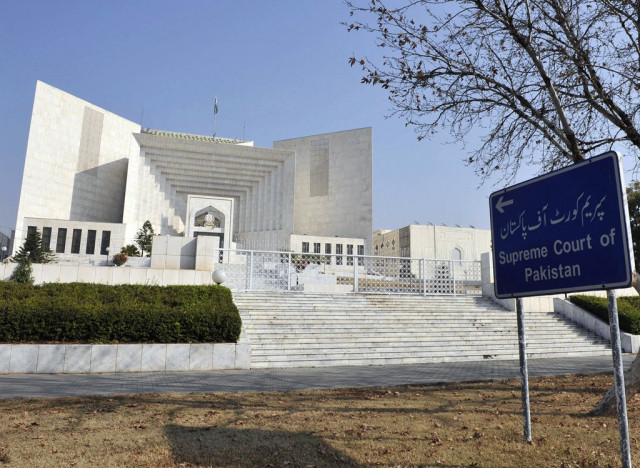HCs barred from reprimanding judges in court
SC restricts passing of judicial strictures against the lower judiciary

The Supreme Court of Pakistan. PHOTO: AFP
"[The] high court should not pass strictures in a judgement against a judge of the district judiciary or summon a judge in judicial proceedings, relating to his or her judgment, for public reprimand in open court," read an 11-page verdict authored by Justice Syed Mansoor Ali Shah.
The other two judges, Justice Manzoor Ahmad Malik and Justice Qazi Muhammad Amin Ahmad, who were part of the bench, also endorsed his verdict over a petition filed by a female judge of the district judiciary against the Peshawar High Court (PHC) passing a stricture against her.
The SC asked whether or not it was appropriate for the high court to record judicial stricture (a stricture recorded in a judgement) against a judge of the district judiciary relating to their ability, conduct, integrity, diligence, behaviour, temperament and competence while examining their verdict.
The court held that in cases where judges of the high court espoused an opinion that the judge of the district judiciary had exhibited grave incompetence or misconducted themselves in discharge of judicial duty and needed to be warned or proceeded against, the appropriate process was to inform the competent authority on the administrative side though a confidential note addressed to the Chief Justice of the court, along with copies of the relevant judgement, and then leaving it to the discretion of the competent authority to take appropriate disciplinary action against the judge concerned.
"This discreet and confidential process is consistent with the deliberative character of the judicial system," the verdict read.
It noted that it was not in the character and dignity of the high court or the justice system to pass judicial strictures and summon judges of the district judiciary in open court.
"It is eminently within the constitutional domain of the high court and indeed desirable that the high court, where appropriate, exercises supervisory control over the district judiciary through administrative disciplinary mechanisms."
It said high courts had ways of expressing disapproval of judgments of the lower courts.
In case inadvertent errors or irregularities of the lower courts are noticed, they can be brought to the notice of the judge concerned through a memorandum or a note addressed to the judge by the high court on the administrative side but not through the judgement, in the exercise of its judicial function.
"The judges of the high court may point them out to the judge of the district judiciary through an administrative note or memorandum maintaining a correctional approach. This also passes for a piece of elderly advice, guidance and counselling of the judge of the district judiciary by the high court. The note or memorandum do not form part of the judgment but are separate administrative communiqués delivered to the judge confidentially and also do not form part of the service dossier of the judge."
The verdict read that the power to supervise and control the district judiciary was to be exercised by the high court under Articles 202 and 203 of the Constitution while exercising its administrative authority.
This constitutional responsibility vests in the high court and not in a judge of a high court exercising judicial power. The power to supervise and control is actualised through High Court Rules and Orders and service laws that govern the judges of the district judiciary.
The structure of service law relating to the district judiciary empowers the competent authority (Chief Justice or the administrative committee of the high court) to take disciplinary action against the judge.
"The high court comes across orders of the lower court, which are not justified either in law or in fact, and modifies them or sets them aside. The concept of appeal and revision to a higher forum presumes that a judge in spite of discharging their duties to the best of their abilities and capacity may still err or make a mistake," the verdict read.
"A judge who has not committed an error is yet to be born."
The verdict read that an error by the lower courts is rectified by the high court, in accordance with the law, which might include the grounds of bias or malice.
Stricture recorded in a judgement, on the other hand, is a "severe" and a "sharp criticism or a censorious remark" and is akin to a "piece of censure" and passes for a "critical remark" about conduct, integrity, diligence, behaviour, temperament, and competence of a judge.
Stricture becomes accessible and remains in the public domain for posterity. Subsequent exoneration of the judge in departmental disciplinary proceedings cannot undo the damage already done, as the stricture continues to exist in the judgment and the mind of the public.
Strictures do not restrain the judge from continuing as a judge but at the same time, shatter their confidence and weaken their performance, it added.



















COMMENTS
Comments are moderated and generally will be posted if they are on-topic and not abusive.
For more information, please see our Comments FAQ